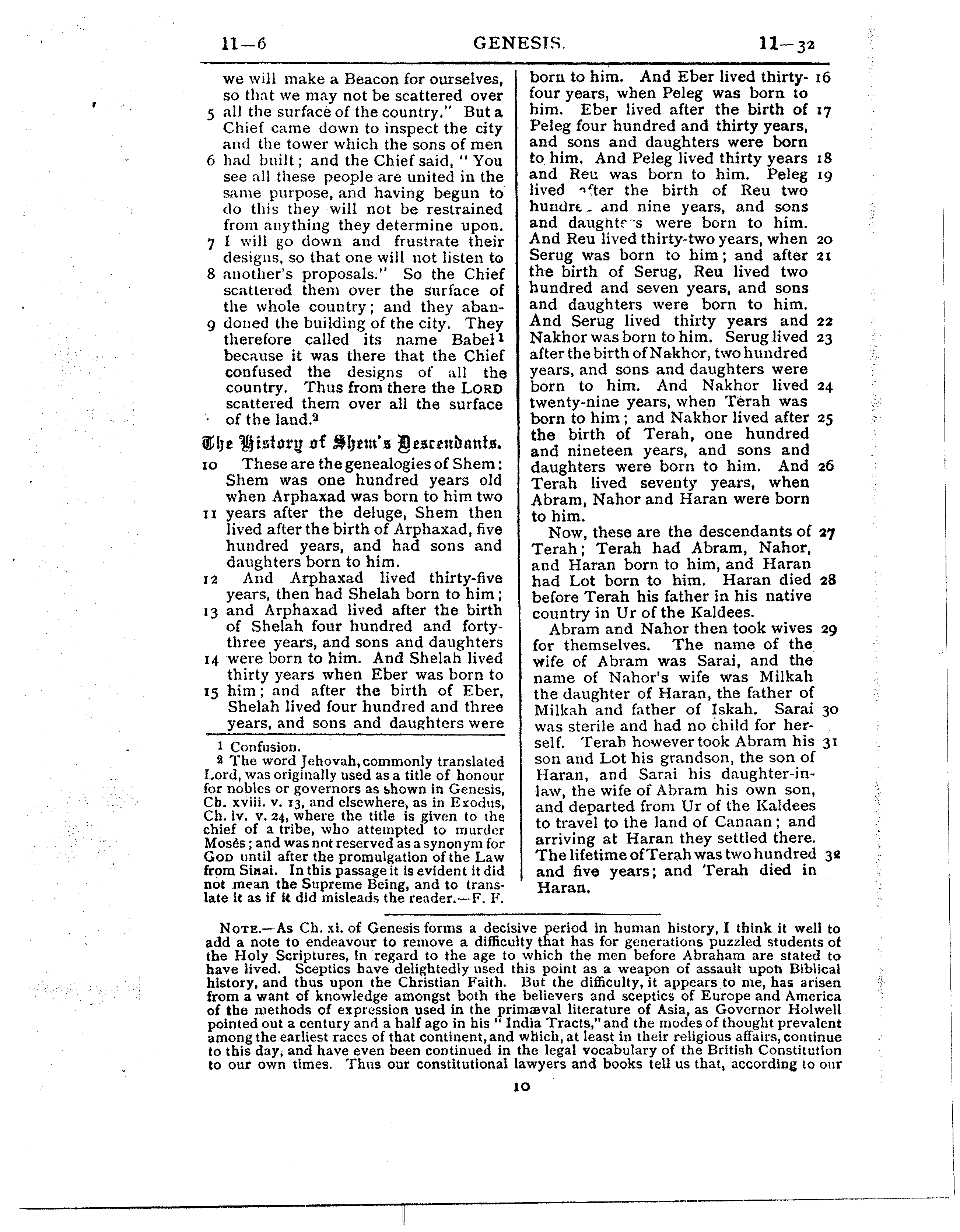Genesis - Ferrar Fenton Bible Translation page 10
The Five Books of Moses
Shem was one hundred years old when Arphaxad was born to him two years after the deluge, Shem then lived after the birth of Arphaxad, five hundred years, and had sons and And Arphaxad lived thirty·five
years, then had Shelah born to him; and Arphaxad lived after the birth of Shelah four hundred and forty- tliree years, and sons and daughters were born to him. And Shelah lived thirty years when Eber was born to him; and after the birth of Eber, Shelah lived four hundred and three years, and sons and daughters were 1 Confusion. 2 The word jehovalncommonly translated
Lord, was originally used as a title of honour for nobles or governors as shown in Genesis, Ch. xviii. v. 13, and elsewhere, as in Exodus, Ch. iv. v. 24, where the title is given to the chief of a tribe, who attempted to murder Moses ; and was not reserved as a synonym for Gon until after the promulgation ofthe Law from Sinai. In this passage it is evident it did not mean the Supreme Being, and to trans- late it as if it did misleads the reader.-·F. F. born to him. And Eber lived thirty- four years, when Peleg was born to him. Eber lived after the birth of Peleg four hundred and thirty years, and sons and daughters were born to, him. And Peleg lived thirty years and Reu was born to him. Peleg lived after the birth of Reu two hundre- and nine years, and sons and daughters were born to him. And Reu lived thirty~two years, when Serug was born to him; and after the birth of Serug, Reu lived two hundred and seven years, and sons and daughters were born to him. And Serug lived thirty years and Nakhor was born to him. Serug lived after the birth of Nakhor, two hundred years, and sons and daughters were born to him. And Nakhor lived twenty-nine years, when Terah was born to him; and Nakhor lived after the birth of '1`erah, one hundred and nineteen years, and sons and daughters were born to him. And Terah lived seventy years, when Abram, Nahor and Haran were born to him. Now, these are the descendants of
'1`erah; Terah had Abram, Nahor, and Haran born to him, and Haran had Lot born to him. Haran died before Terah his father in his native country in Ur of the Kaldees. Abram and Nahor then took wives
for themselves. The name of the wife of Abram was Sarai, and the name of Nahor’s wife was Milkah 16 18 20 2I 22 the daughter of Haran, the father of Milkah and father of lskah. Sarai was sterile and had no child for her- self. '1`erah however took Abram his son and Lot his grandson, the son of Haran, and Sami his daughter~in~ law, the wife of Abram his own son, and departed from Ur of the Kaldees to travel to the land of Canaan; and arriving at Haran they settled there. T he lifetime of Terah was two hundred 26 28 and five years; and Terah died in Haran. iod in human history. I think it well No·rs.—-—As Cl1.xi. of Genesis forms a d ecisive er ,, to add a note to endeavour to remove a difficulty tllat has for generations puzzled students ot the Holy Scriptures, in regard to the age to which the men before Abraham are stated to have lived. Sceptics have delightedly used this point as a weapon of assault upoh Biblical history, and thus upon the Christian Faith. But the didiculty, it appearsto me, has arisen from a want of knowledge amongst both the believers and sceptics of Europe and America of the methods of expression used in the primzeval literature of Asia, as Governor Holwell and the modes of thought prevalent among the earliest races of that continennand which, at least in their religious affairs, continue to this day, and have even been continued in the legal vocabulary of the British Constitution to our own times. Thus our constitutional lawyers and books tell us that, according to our 10
